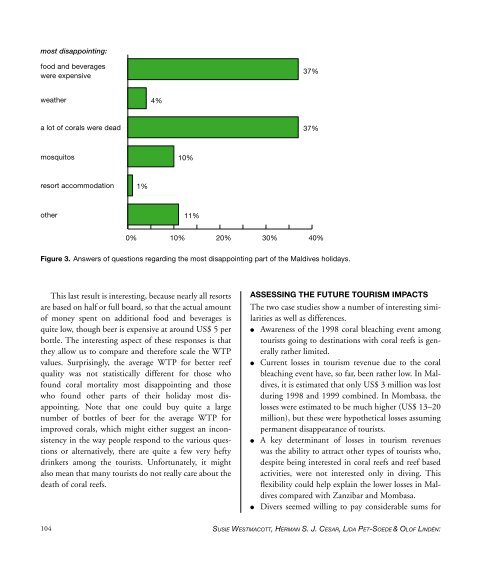You also want an ePaper? Increase the reach of your titles
YUMPU automatically turns print PDFs into web optimized ePapers that Google loves.
most disappointing:<br />
food and beverages<br />
were expensive<br />
37%<br />
weather<br />
4%<br />
a lot <strong>of</strong> corals were dead<br />
37%<br />
mosquitos<br />
10%<br />
resort accommodation<br />
1%<br />
other<br />
11%<br />
0% 10% 20% 30% 40%<br />
Figure 3. Answers <strong>of</strong> questions regarding the most disappointing part <strong>of</strong> the Maldives holidays.<br />
This last result is interesting, because nearly all resorts<br />
are based on half or full board, so that the actual amount<br />
<strong>of</strong> money spent on additional food and beverages is<br />
quite low, though beer is expensive at around US$ 5 per<br />
bottle. The interesting aspect <strong>of</strong> these responses is that<br />
they allow us to compare and therefore scale the WTP<br />
values. Surprisingly, the average WTP for better reef<br />
quality was not statistically different for those who<br />
found coral mortality most disappointing and those<br />
who found other parts <strong>of</strong> their holiday most disappointing.<br />
Note that one could buy quite a large<br />
number <strong>of</strong> bottles <strong>of</strong> beer for the average WTP for<br />
improved corals, which might either suggest an inconsistency<br />
in the way people respond to the various questions<br />
or alternatively, there are quite a few very hefty<br />
drinkers among the tourists. Unfortunately, it might<br />
also mean that many tourists do not really care about the<br />
death <strong>of</strong> coral reefs.<br />
ASSESSING THE FUTURE TOURISM IMPACTS<br />
The two case studies show a number <strong>of</strong> interesting similarities<br />
as well as differences.<br />
● Awareness <strong>of</strong> the 1998 coral bleaching event among<br />
tourists going to destinations with coral reefs is generally<br />
rather limited.<br />
● Current losses in tourism revenue due to the coral<br />
bleaching event have, so far, been rather low. In Maldives,<br />
it is estimated that only US$ 3 million was lost<br />
during 1998 and 1999 combined. In Mombasa, the<br />
losses were estimated to be much higher (US$ 13–20<br />
million), but these were hypothetical losses assuming<br />
permanent disappearance <strong>of</strong> tourists.<br />
● A key determinant <strong>of</strong> losses in tourism revenues<br />
was the ability to attract other types <strong>of</strong> tourists who,<br />
despite being interested in coral reefs and reef based<br />
activities, were not interested only in diving. This<br />
flexibility could help explain the lower losses in Maldives<br />
compared with Zanzibar and Mombasa.<br />
● Divers seemed willing to pay considerable sums for<br />
104<br />
SUSIE WESTMACOTT, HERMAN S. J. CESAR, LIDA PET-SOEDE & OLOF LINDÉN:


















